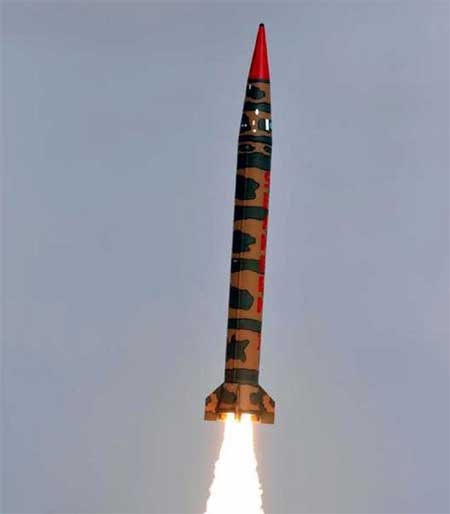Pakistan conducts ballistic missile test

Pakistan said Wednesday it had successfully test-fired an intermediate-range ballistic missile (IRBM), a move seen as an apparent riposte to India's recent missile test.
The Pakistani military said the missile, Shaheen-1 A, is an improved version of the Shaheen-1, which has a range of 750 kilometers.
It did not reveal the exact engagement range of the Shaheen-1 A, but stressed that improvements were made to upgrade range and technical parameters, and the missile can carry both nuclear and conventional warheads.
According to US standards, an IRBM can strike a target 3,000 to 5,500 kilometers away. CNN said the Shaheen-1 A could hit major cities in northern and western India.
Pakistani President Asif Ali Zardari and Prime Minister Yousuf Raza Gilani congratulated scientists and military officials Wednesday after the test.
On April 19, India test-fired its Agni-V missile capable of delivering a nuclear warhead 5,000 kilometers away, giving the country the ability to hit targets as far as Beijing and eastern Europe.
Indian media claimed that the country is now on par with major world powers such as the US and Russia in terms of intercontinental ballistic missile capability.
Fu Xiaoqiang, a researcher at China Institutes of Contemporary International Relations, told the Global Times that Pakistan's move was clearly a response to India's missile launch.
"Apparently, India's missile test escalated tensions between the two sides and prompted Pakistan's response. Geographically, Islamabad does not need a long-range missile to deter threats from India. Wednesday's test was aimed at consolidating a regional strategic balance," Fu said.
General Talat Masood, a Pakistani defense analyst, told AFP that Wednesday's test was part of Pakistan's program to develop nuclear and missile deterrence.
"It has a range of missiles in its inventory. This has perhaps the longest-range among those. The whole object is essentially India-centric, while India's own program is directed at China. Pakistan is improving its missile system as India continues to increase its capability," Masood said.
Due to long-standing border disputes, India and Pakistan fought three full-scale wars in 1947, 1965 and 1971.
They conduct missile tests regularly and usually inform each other in advance.
On July 9, 2006, India test fired an Agni-3 missile which failed. Four months later, Pakistan successfully launched a Hatf-5 missile, which can deliver a warhead over 1,000 kilometers away.
India responded by firing a 350-kilometer range tactical land attack missile three days later.
"Bilateral relations are improving thanks to the resumption of high-level exchanges, but the latest missile tests may unhinge the progress made and harm regional security as a whole," Fu noted.
He downplayed the possibility of another full-scale conflict, or even a nuclear war between the two sides, saying in terms of nuclear weapons, India and Pakistan had reached a balance based on their respective inventories.
Pakistan conducted nuclear tests in May 1998, shortly after India conducted similar ones. US intelligence estimates last year put the number of nuclear weapons deployed by Pakistan at 90 to 110, Reuters reported.
Neither Pakistan nor India has signed the nuclear non-proliferation treaty.
Citing anonymous sources, India's International Business Times reported that the Defense Research & Development Organization, the developer of the Agni-V, has a series of plans concerning future military projects.
India's submarine-launched ballistic missile is expected to be operational by 2013, followed by a missile shield for Delhi by 2014. It is also working on quick-launch micro satellites and Star Wars-like laser weapons, the newspaper said.
Separately, the Pakistan Navy commissioned the PNS Azmat fast-attack craft at the Xingang Shipyard in Tianjin on Tuesday.
PNS Azmat is the first of the Azmat class fast-attack boat equipped with anti-ship missiles.
Pakistan Navy Chief Admiral Muhammad Asif Sandila described it as a milestone in defense and strategic cooperation between Islamabad and Beijing.
Liu Linlin and agencies contributed to this story